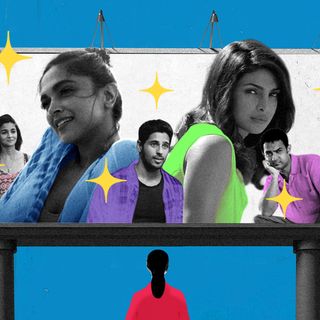
Internet ‘Thirsting’ Is Sexualizing Celebrities in Unforeseen Ways
Stronger para-social relationships and TikTok “thirst” language shift the needle towards normalizing uncomfortable sexualization.

A clip from a Clairo concert recently made the rounds on social media for unhappy reasons. An audience member was heard shouting “you’re so hot!” at the singer — immediately after she performed a song about being sexualized in the workplace. Yet, there she was, at her workplace, being sexualized anyway.
The clip prompted a flurry of discussion about appropriate concert behavior. For some, calling a performer hot at a concert is within the realms of kosher crowd reactions. Others are beginning to question the etiquette around compliments — even when they are paid toward celebrities who, by design, set the standard for attractiveness.
Asking questions about unnecessarily sexualizing or objectifying celebrities isn’t new. But the conversation acquires new light in a pandemic social media landscape, where in-person socializing ground to a halt for two years. This is also a time linked to increased experiences of parasocial relationships — a one-sided bond where people feel connected to famous personalities by virtue of their public presence. It coincided with the rise of TikTok, which in turn came with its own rules, language codes, and aesthetics. A common strand of language on the platform is uncomfortable sexual undertones while expressing admiration for a celebrity’s — usually a woman’s — appearance.
Together, this culture of internet “thirsting” is gaining momentum in unseen and nefarious ways.
Take, for example, the fact that we’ve moved past the “daddy” phase into a “mommy” one. The most recent subject of this particular strand of attention is Sydney Sweeney, who stars as Cassie in Euphoria. Her body has come under scrutiny from several different directions — with some praising it a little too much, and others body-shaming her into tears.
The overwhelming locus of conversation surrounding Sweeney lies in her physical attributes, which the star herself has spoken about as undermining her acting abilities. Yet, photos of her are accompanied with comments laced with irony, such as “I am looking respectfully.” The argument goes that she — and celebrities in general — put herself out there; commenting on her pictures is thus a free-for-all.
Related on The Swaddle:
Why Does ‘Euphoria’ Insist on Sexualizing Teen Girls?
Something similar is at play with Zoë Kravitz, after her turn as Catwoman in The Batman (2022). Internet conversations around her are full of praise and admiration — not for her role, but for how sexy she is.
The conversation around sexualizing women has thus gone full circle: from overt sexualization, to toning it down, back to overt sexualization in the name of reclaiming it for a less sleazy gaze. The question to ponder is: is a sexualizing gaze less alienating if it no longer fits neatly into the definition of the “male gaze”?
“In a world ordered by sexual imbalance, pleasure in looking has been split between active/male and passive/female… in their traditional exhibitionist role women are simultaneously looked at and displayed, with their appearance coded for strong visual and erotic impact,” writes critic and scholar Laura Mulvey in her defining essay on the male gaze in cinema.
In a social media landscape, with cinema receding to the background, and TikTok, Instagram, and Twitter at the forefront of culture-making, it may be worth asking how the male gaze has adapted. Increasingly, the language inherent in the male gaze is now increasingly deployed as an empowering compliment to women who are highly visible.
Arguably, the male gaze is a sexualizing gaze that anybody can have, not just men. It can be said to have blended with a social media gaze — where the male gaze is the default form of looking at and processing images of women in the public eye. The gaze is what informs comment-section heckling that is somehow acceptable to type but not to say out loud, and it also imparts a sexual charge to sincere compliments.
What made the Clairo clip turn viral was how her face noticeably fell at the audience member’s remark. She was later seen to be requesting the crowd not to yell at her, a request which went unheeded as they continued to heckle unwanted compliments at her. The incident raises questions about how we engage with celebrities and why appreciation has become so deeply entwined with sexual undertones.
A new cultural shift is underway, where it is passé to make the usual objectification critique about how we treat people in the public eye — so much so, that the same language of objectification is once again restored under a new name: empowerment, subversion, call it what you will. But the important distinction that separates truly subversive forms of sexual expression from the traditional one is the agency of those involved. As far as the public record shows, Sweeney, Kravitz, and Clairo have not consented to being spoken about in this manner, even if they have put themselves out there.
While there may be nothing inherently wrong in desiring celebrities, expressing it in the form of public “thirst” leads to an uncomfortable reduction of people to the sum of their parts — the consequences of which are troubling to reckon with.
Rohitha Naraharisetty is a Senior Associate Editor at The Swaddle. She writes about the intersection of gender, caste, social movements, and pop culture. She can be found on Instagram at @rohitha_97 or on Twitter at @romimacaronii.
Related


What Are The Batman’s Politics?
